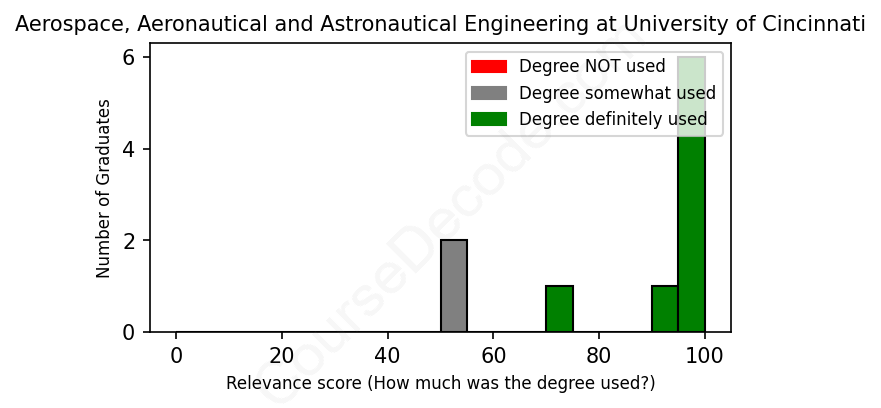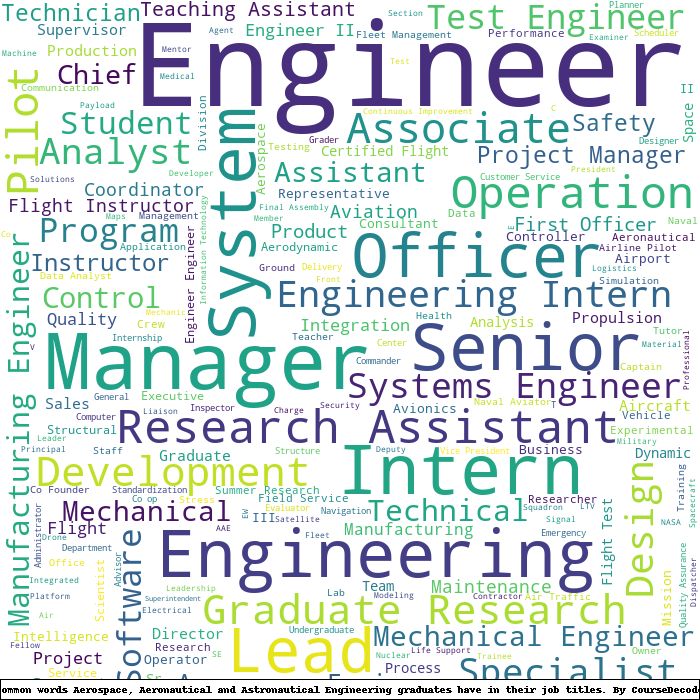
First, some facts. Of the Aerospace, Aeronautical and Astronautical Engineering graduates from University of Cincinnati we've analyzed , here's how many have used (or NOT used) their degree in their career:

These are estimates based on AI analysis of 10 LinkedIn profiles (see below).
The verdict? Significantly above average. Overall, with an average relevance score of 86%, Aerospace, Aeronautical and Astronautical Engineering graduates from University of Cincinnati have a much higher likelihood (+19%) of finding work in this field compared to the average graduate across all fields:
And for comparison, here's the chart for all profiles we've looked at across all degrees.
Also, after graduating, 40% of these graduates have pursued further education other than another Bachelor's degree (such as a Masters degree or other), compared to the average across all profiles of 35%. This suggests you may need more than just a Bachelors degree to be competitive as a Aerospace, Aeronautical and Astronautical Engineering graduate.
See the details:
|
Relevance score: 100% We think this person has gone into a career highly relevant to their degree. We think this person has gone into a career highly relevant to their degree.
DEGREE INFOGraduated in 2019 from University of Cincinnati with a Bachelor's Degree in Aerospace, Aeronautical and Astronautical Engineering. Also pursued further education since (see below). JOB HISTORY SINCE GRADUATIONMSc Aerospace Engineering Student Technische Universiteit Delft Sep 2019 - Mar 2024 FURTHER DEGREES DONE SINCE GRADUATINGMaster of Science - MScTechnische Universiteit Delft 2019 - 2021 ABOUTI am an aerospace engineer living in Houston, TX looking for a position in the space sector that would be both challenging and rewarding to be a part of. I am a U.S. citizen, and am eligible to obtain a security clearance and work on ITAR projects.I received a Master's degree in Aerospace Engineering from TU Delft in the Netherlands after completing and defending a thesis titled, Pose Estimation of an Unknown Uncooperative Target Using LiDAR and Thermal Infrared Fusion. For this research I developed two unique algorithms to determine relative pose and verified and validated their accuracy experimentally. My thesis work enables spacecraft to best identify how to remove a target (space debris) from orbit and implements elements of remote sensing and computer vision, and has further relevance in Space Situational Awareness and Rendezvous and Proximity Operations.In May 2019 I graduated from the University of Cincinnati in the USA with a BSc in Aerospace Engineering and a minor in Astrophysics. My undergraduate program had a designed duration of 5 years to allow students to have meaningful internship/co-op experiences in the engineering world between semesters of studying. Accordingly, I have worked for 3 separate companies for a total of 16 months as an engineering intern participating in a diverse selection of projects. |
The top 10 most common jobs done by the graduates we've analyzed (ranked most common to least) are:
When checking out job positions for folks who graduated with a degree in Aerospace, Aeronautical, and Astronautical Engineering from the University of Cincinnati, it’s clear that many of them landed roles that are directly tied to their major. A good number of them worked in areas like design engineering, UAV operations, and even advanced roles at big names like GE Aerospace. For instance, graduates from 2014 to 2023 have taken on positions such as engineers, UAV test pilots, and researchers, all of which heavily rely on the skills gained from their degree. These jobs not only utilize their technical knowledge but also showcase the versatility that an aerospace degree can offer in various sectors.
However, it’s interesting to note that not all career paths taken by these graduates are strictly related to aerospace engineering. Some have branched out into roles like insurance agents, business development managers, and application engineers, indicating that while their educational background provides a strong foundation, it doesn't always lead them directly back to aerospace-intensive positions. Overall, many jobs are indeed relevant to their studies, particularly in engineering and aerospace roles. Still, there’s a significant portion of graduates exploring less traditional paths that don’t fully apply their degree. This mix shows that while a degree in aerospace opens many doors, graduates can find success in a range of fields, even if they stray from their original focus.
Here is a visual representation of the most common words in job titles for Aerospace, Aeronautical and Astronautical Engineering graduates (this is across all Aerospace, Aeronautical and Astronautical Engineering graduates we've analyzed, not just those who went to University of Cincinnati):

When looking at the career trajectories of graduates from the University of Cincinnati with degrees in Aerospace, Aeronautical, and Astronautical Engineering, it’s clear that many of them have started off their careers in relevant fields shortly after graduation. For instance, several graduates from 2014 and onward have taken positions at major companies in the aerospace sector, such as GE Aerospace and Workhorse. Entry-level positions like Edison's Engineer or UAV Test Pilot are common first jobs, which shows a strong trend towards landing roles in engineering that directly apply their education. Additionally, roles such as Commercial Drone Pilot and Technical Sales Manager indicate diverse career paths that are still linked to their aerospace background.
As we look five to ten years down the line, many of these graduates have continued to advance within the aerospace industry, taking on leadership roles and specialized positions—like Lead Design Engineer or Advanced Lead Engineer. This upward mobility illustrates that the degree is not only valuable in landing a first job but also plays a crucial role in long-term career development. However, there are a few instances of graduates veering off the traditional engineering path, such as becoming an Insurance Agent or working as a Deicer, which may not fully utilize their aerospace expertise. Overall, though, the majority seem to be thriving in careers relevant to their field, making a strong impact in the aerospace and engineering sectors.
Honestly, pursuing a Bachelor’s degree in Aerospace, Aeronautical, and Astronautical Engineering is pretty challenging, and the University of Cincinnati is no exception. You'll be diving into some pretty intensive math and physics courses, plus a lot of hands-on projects and teamwork that can test your problem-solving skills. While it's definitely manageable with dedication and good study habits, you should definitely brace yourself for sleepless nights and some seriously head-scratching moments. Overall, it's on the tougher side compared to many other majors, but if you’re passionate about it and ready to put in the work, it can be a rewarding experience!
Most commonly, in the LinkedIn profiles we've looked at, it takes people 5 years to finish a Bachelor degree in Aerospace, Aeronautical and Astronautical Engineering.
Looking at these graduates from the University of Cincinnati, it seems like most of them are doing pretty well in terms of their careers, especially considering the aerospace and engineering sectors tend to pay well. For instance, those who took on positions at big names like GE Aviation and Stellantis are likely raking in solid salaries, especially since they're moving up the ladder into lead and staff engineer roles. Even the ones who've taken more unconventional paths, like the drone pilot and business development roles, seem to be finding unique opportunities that can pay decent dough. The ones still in school or just starting out, like the recent grads, are landing internships and entry-level positions at respected firms, which usually bodes well for their future earnings. Overall, they seem to be on a good track to make decent money in their fields!
Here is a visual representation of the most common words seen in the "about" section of LinkedIn profiles who have a Bachelor degree in Aerospace, Aeronautical and Astronautical Engineering (this is across all Aerospace, Aeronautical and Astronautical Engineering graduates we've analyzed, not just those who went to University of Cincinnati). This may or may not be useful:

Here are all colleges offering a Bachelor degree in Aerospace, Aeronautical and Astronautical Engineering (ordered by the average relevance score of their Aerospace, Aeronautical and Astronautical Engineering graduates, best to worst) where we have analyzed at least 10 of their graduates:
| College | Score | Count |
|---|---|---|
 Texas A&M University Texas A&M University
|
87 | 22 |
 California Polytechnic State University-San Luis Obispo California Polytechnic State University-San Luis Obispo
|
86 | 12 |
 University of Cincinnati University of Cincinnati
|
86 | 10 |
 Purdue University Purdue University
|
85 | 40 |
 Rensselaer Polytechnic Institute Rensselaer Polytechnic Institute
|
85 | 17 |
 Georgia Institute of Technology Georgia Institute of Technology
|
84 | 23 |
 Liberty University Liberty University
|
81 | 21 |
 Iowa State University Iowa State University
|
80 | 16 |
 University of Colorado Boulder University of Colorado Boulder
|
80 | 13 |
 California State Polytechnic University-Pomona California State Polytechnic University-Pomona
|
79 | 13 |
 United States Naval Academy United States Naval Academy
|
77 | 12 |
 The Ohio State University The Ohio State University
|
76 | 20 |
 University of Central Florida University of Central Florida
|
75 | 25 |
 Arizona State University Arizona State University
|
74 | 12 |
 University of Michigan University of Michigan
|
74 | 10 |
 Embry-Riddle Aeronautical University Embry-Riddle Aeronautical University
|
71 | 163 |
 Penn State University Penn State University
|
68 | 12 |
 Florida Institute of Technology Florida Institute of Technology
|
67 | 20 |
 The University of Alabama in Huntsville The University of Alabama in Huntsville
|
67 | 11 |
 Embry Riddle Aeronautical University-Worldwide Embry Riddle Aeronautical University-Worldwide
|
66 | 10 |
 University of Illinois at Urbana-Champaign University of Illinois at Urbana-Champaign
|
48 | 10 |